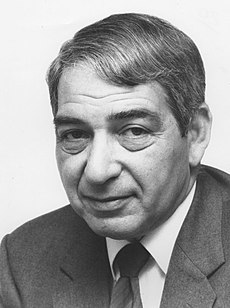
Back فرانك هاهن Arabic فرانك هاهن ARZ Frank Hahn (Wirtschaftswissenschaftler) German Frank Hahn Spanish Frank Horace Hahn French フランク・ハーン Japanese Franciscus Hahn Latin Frank Hahn Dutch Хан, Фрэнк Russian Френк Хан Ukrainian
Frank Hahn | |
|---|---|
 | |
| Born | 26 April 1925 Berlin, Germany |
| Died | 29 January 2013 (aged 87) Cambridge, England |
| Nationality | British |
| Academic career | |
| Field | Economics |
| Institutions | University of Birmingham Cambridge University London School of Economics |
| Alma mater | London School of Economics |
| Doctoral advisor | Nicholas Kaldor Lionel Robbins |
| Doctoral students | Christopher Bliss Douglas Gale Edwin Mills (economist) James Mirrlees David Newbery Stephen Nickell Subroto Roy (economist) Hamid Sabourian Anthony Shorrocks |
| Contributions | General equilibrium theory, critique of monetarism, monetary theory, Keynesian economics, Non-Walrasian economics, "Hahn's problem", Stability of general equilibrium |
| Information at IDEAS / RePEc | |
Frank Horace Hahn FBA (26 April 1925 – 29 January 2013) was a British economist whose work focused on general equilibrium theory, monetary theory, Keynesian economics and critique of monetarism.[1][2] A famous problem of economic theory, the conditions under which money, which is intrinsically worthless, can have a positive value in a general equilibrium, is called "Hahn's problem" after him. One of Hahn's main abiding concerns was the understanding of Keynesian (Non-Walrasian) outcomes in general equilibrium situations.
- ^ Enciclopedia italiana di scienze, lettere ed arti, Volume 2, 1938, p. 548.
- ^ "Professor Frank Hahn: 1925 – 2013/". Churchill College, Cambridge. January 2013. Archived from the original on 16 October 2013. Retrieved 31 January 2013.